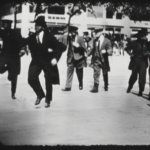Sleuth by Joseph L. Mankiewicz
One-line summary: A thrilling game of wits ensues between a successful mystery writer and a young hairdresser who is having an affair with the writer’s wife.
Main Cast and Crew:
- Director: Joseph L. Mankiewicz
- Writer: Anthony Shaffer
- Key Actors: Laurence Olivier as Andrew Wyke, Michael Caine as Milo Tindle
- Music Director: John Addison
- Director of Photography: Oswald Morris
- Producers: Morton Gottlieb, Walter Mirisch
Plot:
In “Sleuth,” Andrew Wyke, a wealthy and renowned mystery writer, invites Milo Tindle, a young hairdresser, to his country estate. Andrew suspects that Milo is having an affair with his wife, Marguerite, and proposes an unusual plan to resolve the situation. He suggests that Milo should steal Marguerite’s jewelry, sell it, and keep the money. Andrew, in turn, would collect the insurance money and be rid of his unfaithful wife.
Milo reluctantly agrees to the plan, but as the two men delve deeper into their scheme, it becomes apparent that Andrew has more sinister intentions. The game of cat and mouse between the two characters intensifies, with each trying to outsmart the other. Their interactions are filled with mind games, manipulation, and unexpected twists, blurring the lines between reality and fiction.
As the plot unfolds, the audience is taken on a rollercoaster ride of suspense and psychological tension. The story is driven by the characters’ complex motivations and their desire for power and control. The audience is left guessing who is truly in control and what the ultimate outcome will be.
Themes and Motifs:
“Sleuth” explores themes of deception, manipulation, and the power dynamics between individuals. The film delves into the idea of identity and how it can be constructed and manipulated. The characters constantly shift their personas and motivations, blurring the lines between truth and fiction. The setting of the country estate adds to the atmosphere of confinement and isolation, heightening the psychological tension.
Reception and Legacy:
Upon its release in 1972, “Sleuth” received critical acclaim for its gripping screenplay, stellar performances, and intricate plot. The film was nominated for four Academy Awards, including Best Actor for both Laurence Olivier and Michael Caine. It won the BAFTA Award for Best Cinematography and the Edgar Award for Best Motion Picture Screenplay.
“Sleuth” has left a lasting impact on cinema, particularly in the thriller genre. Its clever twists and turns, along with the brilliant performances by Olivier and Caine, have made it a classic in the genre. The film has been praised for its intelligent dialogue and the way it keeps the audience engaged until the very end.
Recommendation:
For fans of psychological thrillers and intricate mind games, “Sleuth” is a must-watch. The film’s brilliant performances, gripping plot, and clever twists make it a captivating experience. Joseph L. Mankiewicz’s direction and Anthony Shaffer’s screenplay create a tense and suspenseful atmosphere that keeps viewers on the edge of their seats. If you enjoy films that challenge your perception of reality and keep you guessing until the final moments, “Sleuth” is a film worth exploring.
Memorable Quote:
Andrew Wyke: “The game, Mrs. Tindle, is called Crime and Punishment.”












